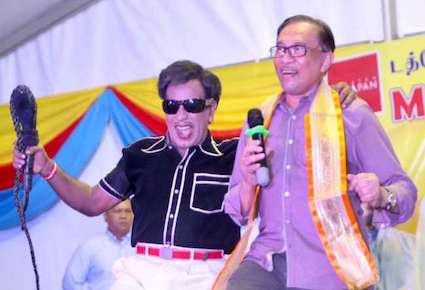Anwar Ibrahim and the Malaysian Indian Community: A Growing Dissatisfaction
MALAYSIAKU


Anwar Ibrahim dances on stage to a popular Tamil song during a campaign speech for the Seri Setia by-election in Desa Mentari.
Anwar Ibrahim and Malaysia’s Indian Community: Can the Gap Be Bridged?
Since becoming prime minister in late 2022, Anwar Ibrahim has championed unity and inclusivity. Yet, murmurs of discontent linger among Malaysian Indians. Is this frustration rooted in real issues, or is perception clouding reality? Let’s break it down.
Economy: Feeling Left Behind
Malaysia’s economic policies have long prioritized the Bumiputera group (mostly Malays) through affirmative action. While intended to uplift the majority, many Indian Malaysians feel sidelined.
The Bumiputera Advantage
From government contracts to scholarships, opportunities often tilt toward Bumiputeras. For Indian communities, this imbalance fuels a sense that success hinges on who you know, not what you bring to the table.
Past Promises and Scandals
Najib Razak’s era saw initiatives like the Indian Community Transformation Unit (ICTU), but corruption scandals like 1MDB overshadowed progress. Trust eroded, leaving many skeptical about future efforts.
Anwar’s Broad Approach: A Double-Edged Sword
Anwar’s focus on national poverty reduction sounds noble, but critics argue it misses the mark. Indian Malaysians face unique hurdles—higher poverty rates, limited access to resources—and generic solutions don’t cut it. The community wants policies that address their specific struggles.
Education: A Fight for Fairness
Tamil schools are cultural lifelines, yet funding gaps and infrastructure issues persist.
Unequal Support
While some funds flow to Tamil schools, many argue they’re still under-resourced compared to Malay-majority institutions. Parents worry their kids are starting behind in the race.
The Schoolgirl Incident
When Anwar scolded a student at a Tamil school event, it sparked outrage. For many, it wasn’t just about the moment—it symbolized a lack of cultural understanding from leadership.
Najib’s Legacy: Visibility vs. Substance
Najib actively attended Tamil school events, earning goodwill. Whether his actions led to lasting change is debatable, but his presence signaled recognition—a bar Anwar’s team hasn’t cleared yet.
Culture and Religion: A Delicate Dance
Malaysia’s diversity demands sensitivity. Recent missteps, however, have widened divides.
Public Conversions: Fueling Tensions
A televised conversion event stirred anger, with critics calling it tone-deaf. Non-Muslims questioned why such acts are publicized, amplifying fears of marginalization.
Zakir Naik: A Thorny Issue
Anwar’s handling of controversial preacher Zakir Naik drew flak. Many felt his silence on Naik’s divisive rhetoric showed indifference to minority concerns.
Temples Under Threat
Demolitions of Hindu temples and unresolved land disputes remain raw wounds. For Indian Malaysians, these aren’t just buildings—they’re symbols of heritage and belonging.
Thaipusam: A Missed Moment
Anwar’s fleeting appearance at Thaipusam celebrations disappointed many. Compared to Najib’s hands-on involvement in past years, it felt like a lost chance to connect with a deeply meaningful tradition.
Voices Online: Frustration Boils Over
Social media reflects simmering anger:
“Skipping Thaipusam shows we’re an afterthought.” – @MalaysianUnityNow
“Why broadcast conversions? It pressures non-Muslims.” – @RaviKumar92
“Temples fall, but no justice. Where’s our protection?” – @SaveOurTemples
Old Wounds, No Closures
Some battles drag on without answers:
Land Rights: Plantation workers still fight for fair ownership.
Citizenship Hurdles: Paperwork nightmares block access to education and jobs for some.
ICTU’s Mixed Record: While it helped a few, many see it as more symbolism than substance.
What’s Next?
Fixing this requires more than photo ops. Policies must tackle economic exclusion, fund schools equitably, and protect cultural spaces. Malaysia thrives on diversity—its leaders must act like it. With social media amplifying dissent, Anwar’s government can’t afford to ignore these voices. Real change starts with listening, not just leading.
